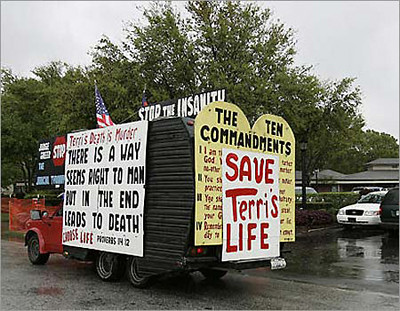If He Was a Messiah ... Why All The Insanity Then?

"We have a court that has essentially stuck its finger in God's eye and said we're going to legislate you out of the schools. We're going to take your commandments from off the courthouse steps in various states. We're not going to let little children read the commandments of God. We're not going to let the Bible be read, no prayer in our schools. We have insulted God at the highest levels of our government. And then we say, 'Why does this happen?' Well, why it's happening is that God Almighty is lifting his protection from us."
- Pat Robertson, explaining on his 700 Club cable TV program why the terrorist attacks of September 11, 2001, had occurred two days earlier (but oblivious as to why such nations as Sweden and The Netherlands, which are more secular than the U.S. could ever hope to be, are spared such tragedies), quoted from Beth Corbin.
"If Jesus had been killed twenty years ago, Catholic school children would be wearing little electric chairs around their necks instead of crosses."
- Lenny Bruce
Ah, yes! It's all about the values. You just had to know that the unctuous wonder of NBC, Pudgy Timmy, who is also known as the Pillsbury Doughboy of pundit TV, had to see the ratings opportunity for Meet The Press: He couldn't let go of such a wonderful opportunity to rattle the cage under the guise of actually giving a shit. Hell, Sparky, there's nothing like Easter Sunday to make us grab onto those bloody wooden Christ-o-fixation symbols and profess our allegiance like Stuart Smalley drinking mightly from the Jerry Fallwell Kool Aid dispenser.
PUDGY TIMMY: I want to read something that you said to The Washington Post in 2003: "Catholics have no right to impose their views on others. Even if they say homosexual conduct is unfitting for a Catholic, they have no right to impose that on the nation."
If you believe that homosexuality is immoral or that abortion is the taking of a life, or that you believe very strongly that Terri Schiavo should remain on a tube, are you not honor-bound as a political figure to try to, in effect, bring about that result, if it's a firmly held motional belief?
REV. DRINAN (MY KINDA PADRE): Yes and no. Go back to Vatican II. Three thousand bishops agonized over this, and at the end of the day, they said that the church should never seek to impose its views. They should not have any shadow of coercion, renouncing 20 centuries of the church dominating the scene. So I think that it's a different world, and we respect everybody else and there's lots of things that are immoral that should not be illegal.
...
PUDGY TIMMY: There are now more Muslims than Jews in America. Is there an Islamic view of the Schiavo case? Is there a monolithic view?
PROFFESSOR ASLAN: No, just as there isn't a monolithic view amongst Christians and amongst Jews or amongst any religious faith. I think that most Muslims agree that life is a precious commodity, that we must endure life and we must respect it and value it. But I also think that the important thing about this Schiavo case is that it is bringing up, not just a legal issue, but as Father said, it's bringing up this--an important debate about what life truly is. Is it just simply a heartbeat or is it a matter of quality of life? Is it a matter of vitalism?
...
PUDGY TIMMY: You are a Catholic priest, a Jesuit. You are also a member of Congress, and then the pope told you, "Get out of politics." What was it like when you received that order?
REV. DRINAN (THE PADRE GETS IT): Well, it's a little more complicated than that. They changed canon law. I had the permission of Cardinal Cushing to run for Congress, and he was enthusiastic about it. There were three or four Catholic priests in politics in Latin America, and they were contentious, and they were now revising canon law. So all that the pope did was to centralize the decision. A bishop can't do it anymore, the Holy See has to do it. And if you want to see some up-side to it, after I left Congress, I was in Brazil, talking to some priests over there, and one priest said to me, "We wept for you," but that if priests were allowed to enter the Congress all over the world, we would have people who were very conservative, fascists, the brothers of generals becoming elected in Latin America.
PUDGY TIMMY: You don't miss it?
REV. DRINAN: Democrats say they're not happy up there these days.
Watching Pudgy Timmy bob and weave this morning reminded me that it seems we have supplanted the 12-step du jour society for an evangelical one, with organized religion seizing upon our general level of emptiness as individuals trying to find our way in a rapid-fire world with all the cookie cutter answers found in an interpretative account of one man's life while under the thumb of despotic Rome. That, to me, has always been the historical context of the Jesus allegory and it may be that Jesus in his real form was probably a number of characters put to the cross as political prisoners or seen as a threat to the general order of things - sacrificed either at the behest of the Romans who needed some ritualized blood letting (and they were heavy into the need for symbolic sacrifices and punishments) or the Jews with their own political ambitions in mind - with the Legions or the Praetorian Guard running an Abu Ghraib-like interrogation facility of their own in the land of Judea ... and who under Caesar could fault them for making a few mistakes and creating a martyr or two along the way?
Martyrs, like Christ and his apostles, were a very big deal in the ancient world - and they were necessary to fuel the debate between religion and politics and power. The Catholic Encyclopedia takes the exploration of martyrs from there:
Acceptance of the national religion in antiquity was an obligation incumbent on all citizens; failure to worship the gods of the State was equivalent to treason. This universally accepted principle is responsible for the various persecutions suffered by Christians before the reign of Constantine; Christians denied the existence of and therefore refused to worship the gods of the state pantheon. They were in consequence regarded as atheists. It is true, indeed, that the Jews also rejected the gods of Rome, and yet escaped persecution. But the Jews, from the Roman standpoint, had a national religion and a national God, Jehovah, whom they had a full legal right to worship. Even after the destruction of Jerusalem, when the Jews ceased to exist as a nation, Vespasian made no change in their religious status, save that the tribute formerly sent by Jews to the temple at Jerusalem was henceforth to be paid to the Roman exchequer.
Doesn't it always come down to death and taxes and who exactly is passing the plate on Sundays? And there's no reason better to ask for just a little bit more when the anniversary of martyrdom is at hand.
For some time after its establishment, the Christian Church enjoyed the religious privileges of the Jewish nation, but from the nature of the case it is apparent that the chiefs of the Jewish religion would not long permit without protest this state of things. For they abhorred Christ's religion as much as they abhorred its Founder. At what date the Roman authorities had their attention directed to the difference between the Jewish and the Christian religion cannot be determined, but it appears to be fairly well established that laws proscribing Christianity were enacted before the end of the first century. Tertullian is authority for the statement that persecution of the Christians was institutum Neronianum - an institution of Nero - (Ad nat., i, 7).
Of the 249 years from the first persecution under Nero (64) to the year 313, when Constantine established lasting peace, it is calculated that the Christians suffered persecution about 129 years and enjoyed a certain degree of toleration about 120 years. Yet it must be borne in mind that even in the years of comparative tranquillity Christians were at all times at the mercy of every person ill-disposed towards them or their religion in the empire. Whether or not delation of Christians occurred frequently during the era of persecution is not known, but taking into consideration the irrational hatred of the pagan population for Christians, it may safely be surmised that not a few Christians suffered martyrdom through betrayal.
From the age of Constantine even still greater veneration was accorded the martyrs. Pope Damasus (366-84) had a special love for the martyrs, as we learn from the inscriptions, brought to light by de Rossi, composed by him for their tombs in the Roman catacombs. Later on veneration of the martyrs was occasionally exhibited in a rather undesirable form; many of the frescoes in the catacombs have been mutilated to gratify the ambition of the faithful to be buried near the saints (retro sanctos), in whose company they hoped one day to rise from the grave. In the Middle Ages the esteem in which the martyrs were held was equally great; no hardships were too severe to be endured in visiting famous shrines, like those of Rome, where their relics were contained.
So, essentially, the entire psychotic rabble of evangelicals clutching "graven images" and praying for Saint Schiavo's mystical powers is based on nothing more than a suspension of disbelief - a literary tactic mastered by guys like Robert Ludlum and Tom Clancy - which means that the writer throws in a few key historical facts and weaves a mind-blowing narrative with larger than life characters around which the storytelling and dialogue confers status to the plot. Some may call this hypothesis a form of blasphemy - and I readily admit that it is only "best guess" from a number of theological accounts, mind you - and they may even chalk this up to a deviant's acidic rationale, but in reality this Jesus archetype probably lived a dissident's humble existence with a loyal group of followers who were trying to find their own way in a harsh ancient world and he died a violent death for giving people hope or thinking beyond the horizon or mountaintop. Sounds like a version of Martin Luther King with a lesser form of weaponry ... the more I think about it.
But overall Easter is a symbol of rebirth, and in that sense I wholeheartedly join with your reason to celebrate for that reason only - no matter the religious affinity, or whether you believe in the Easter Bunny or not - because the winter of our extreme discontent is finally over and here comes Spring.
Enjoy the silence, hope that many more of us have awakened to the cold reality and don't do something really stupid while on a chocolate buzz.



0 Comments:
Post a Comment
Subscribe to Post Comments [Atom]
<< Home